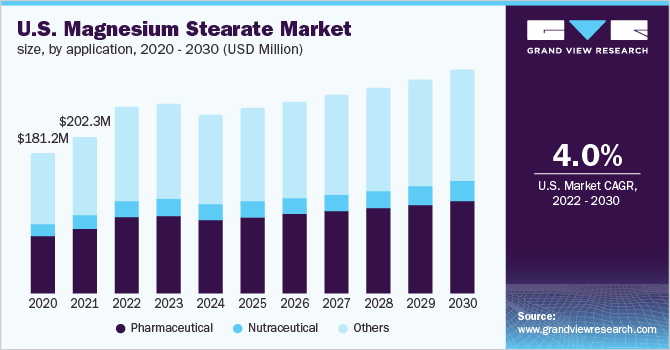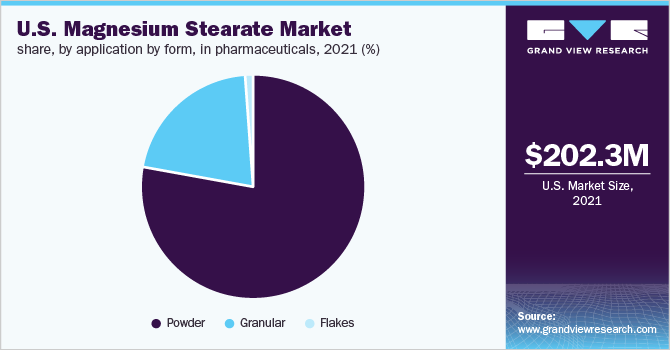- Home
- »
- Organic Chemicals
- »
-
U.S. Magnesium Stearate Market Size & Share Report, 2030GVR Report cover
![U.S. Magnesium Stearate Market Size, Share & Trends Report]()
U.S. Magnesium Stearate Market Size, Share & Trends Analysis Report By Application, By Form (Pharmaceutical, Nutraceutical), And Segment Forecasts, 2022 - 2030
- Report ID: GVR-4-68039-952-7
- Number of Report Pages: 61
- Format: PDF, Horizon Databook
- Historical Range: 2018 - 2020
- Forecast Period: 2022 - 2030
- Industry: Bulk Chemicals
Report Overview
The U.S. magnesium stearate market size was valued at USD 202.26 million in 2021 and is expected to expand at a compound annual growth rate (CAGR) of 4.0% in terms of revenue from 2022 to 2030. This growth of the market is attributed to the growing demand for nutraceutical products to boost immunity owing to the growing health consciousness among the consumers in the U.S. Steady growth in the demand for the product as a lubricant in the pharma and nutraceutical sector is likely to maintain consistency in the product demand.

The U.S. is one of the largest pharmaceutical markets across the globe as it is home to leading pharma companies. The increasing geriatric population in the country and the growing focus of the masses on their health are driving the pharmaceuticals market which is expected to have a positive impact on the market for magnesium stearate in the coming years.
The market has experienced significant challenges owing to high raw material prices. The key raw material required in the production of the product is stearic acid. Stearic acid is a long-chain fatty acid that is obtained from animal fat and vegetable oils. Palm kernel oil is most prominently used in the production of stearic acid. Price fluctuations of palm kernel oil lead to instability in the cost of stearic acid, which in turn hampers the market. Apart from magnesium stearate, some of the commonly used substitutes include calcium stearate, zinc stearate, talc, hydrogenated vegetable oil, waxes, sodium stearyl fumarate, and glyceryl behenate.
The product is commonly produced as stearic acid, which is generally derived from palm oil and magnesium salts such as magnesium oxides, sodium stearate, magnesium hydroxides, and magnesium sulfate. Stearic acid, also known as octadecanoic acid, is a colorless waxy solid with long-chain fatty acid and an ester of fatty alcohol. It is primarily derived from animal fat. It can also be derived from vegetable oil, palm kernel oil, coconut oil, sunflower oil, rapeseed oil, and soybean oil.
The increasing popularity of natural ingredients in dietary supplements has pushed the pharma and nutraceutical industry to respond to the growing demand for new natural substitutes. For instance, NOW Foods are reformulating products focusing on line with alternatives to magnesium stearate. The company has started using natural excipients such as stearic acid or ascorbyl palmitate. However, the company also states that these alternatives have limitations on account of different physical properties.
Thus, necessitating product-specific R&D for the determination of feasibility. For softgel capsules, NOW Foods uses various other excipients instead of stearic acid, which are vegetable oils, zinc oxide, carob pod extract, annatto seed extract, and lecithin among others.
The product manufacturers focus on the use of advanced technology during various steps of production. The manufacturers are aiming to improve the free-flowing nature of the product by preserving surface properties. The companies strengthen on constant research and innovation process to develop magnesium stearates with improved properties. Maintaining pH level is one of the key parameters in the magnesium stearates development process.
Double decomposition and direct reaction are the most commonly used processes for manufacturing the product. Double decomposition involves the reaction of stearic acid with sodium hydroxide to form soda soap which is followed by the generation of water-insoluble magnesium stearate and effluent brine using water-soluble magnesium salt.
The product is significantly used in the pharmaceutical industry. The pharmaceutical industry typically uses pharma-grade magnesium stearate as an inactive ingredient in the drug manufacturing process to achieve lubrication, dissolution delay, and desired hopper flow. In addition, the product is also used to obtain films on the tablets that improve drug liberation time. The pharmaceutical industry is growing at a rapid pace due to the increasing instances of chronic diseases and dependency on drugs.
Application By Form Insights
The pharmaceuticals segment accounted for the largest revenue share and is predicted to grow with a 4.2% CAGR in terms of revenue during the forecast period. This is attributed to the growing pharma industry in the country due to the high focus of pharma companies on research & development. Magnesium stearate is available in both powder and liquid forms; however, powdered form is preferably used in various industries due to the ease of mixing. The product holds several exceptional properties such as low bulk density, less order, and high flowability.
The nutraceuticals application segment accounted for a revenue share of around 9% in 2021 and is expected to grow with a CAGR of 3.8% in the coming years. This is attributed to the growing consumer inclination toward preventive health care has further bolstered the demand for dietary supplements in the recent past. In addition, increasing demand for immunity-boosting supplements in the U.S. amid the COVID-19 pandemic is one of the significant factors which spurred product demand recently.

The product finds application in various other industries including personal care, food & beverages, and others. It is used as a texturizer, opacifier, and non-gelling thickener in creams, shampoos, eyeliners, sunscreen lotions, body powders, and foot powders in the personal care industry. In food & beverages, the product is used as an additive owing to its anticaking, lubrication, emulsification, thickening, binding, and antifoaming properties.
Key Companies & Market Share Insights
Market leaders have recognized the future growth prospects of the magnesium stearate market and are constantly working towards innovation and focusing on quality products for the market to maintain their dominance. Companies including PMC Biogenix, Norac Additives LLC, and Mallinckrodt Pharmaceuticals are leaders in magnesium stearate manufacturing, in terms of revenue, product portfolio, and patented products.
Players are engaged in adopting several strategies including business expansions to increase their market presence. For instance, In February 2022, Acme Hardesty announced a new business unit under the name Life Sciences. The business unit would serve various new and expanding markets which would include pharmaceutical ingredients, food and beverages, animal feed and supplements, and nutritional supplements. Some prominent players in the U.S. magnesium stearate market include:
-
Mallinckrodt Pharmaceuticals
-
PMC Biogenix, Inc.
-
Barentz
-
DPL-US
-
Acme Hardesty
-
Valtris Specialty Chemicals
-
AIE Pharmaceuticals, Inc.
-
Norac Additives LLC
-
Faci S.p.A
-
James M. Brown Ltd.
-
Parchem Fine & Specialty Chemicals
U.S. Magnesium Stearate Market Report Scope
Report Attribute
Details
Market size value in 2022
USD 240.55 million
Revenue forecast in 2030
USD 288.31 million
Growth Rate
CAGR of 4.0% from 2022 to 2030
Base year for estimation
2021
Historical data
2018 - 2020
Forecast period
2022 - 2030
Quantitative units
Volume in Tons, Revenue in USD Thousand, and CAGR from 2022 to 2030
Report coverage
Revenue & volume forecast, company ranking, competitive landscape, growth factors, and trends
Segments covered
Application by form
Country scope
U.S.
Key companies profiled
Mallinckrodt Pharmaceuticals; PMC Biogenix, Inc.; Barentz; DPL-US; Acme Hardesty; Valtris Specialty Chemicals; AIE Pharmaceuticals, Inc.; Norac Additives LLC; Faci S.p.A; James M. Brown Ltd.; Parchem Fine & Specialty Chemicals
Customization scope
Free report customization (equivalent up to 8 analysts working days) with purchase. Addition or alteration to country, regional & segment scope.
Pricing and purchase options
Avail customized purchase options to meet your exact research needs. Explore purchase options
Segments Covered in the Report
This report forecasts the volume and revenue growth at the country level and provides an analysis of the latest industry trends in each of the sub-segments from 2018 to 2030. For this study, Grand View Research has segmented the U.S. magnesium stearate market report based on application by form:
-
Application by Form Outlook (Volume, Tons; Revenue, USD Thousand, 2018 - 2030)
-
Pharmaceutical
-
Powder
-
Granular
-
Flakes
-
-
Nutraceutical
-
Powder
-
Granular
-
Flakes
-
-
Others
-
Frequently Asked Questions About This Report
b. The U.S. Magnesium Stearate market size was estimated at USD 202.26 million in 2021 and is expected to reach USD 240.55 million in 2022.
b. The U.S. Magnesium Stearate market is expected to grow at a compound annual growth rate of 4.0% from 2022 to 2030 to reach USD 288.31 million by 2030.
b. Pharmaceutical segment dominated the U.S. Magnesium Stearate market with a share of 50.18% in 2021. This is attributable to significant product consumption as a lubricant for pharmaceutical tableting application
b. Some key players operating in the U.S. Magnesium Stearate Market include, Mallinckrodt Pharmaceuticals, PMC Biogenix, Inc., Barentz, DPL-US, Acme Hardesty, Valtris Specialty Chemicals, AIE Pharmaceuticals, Inc., Norac Additives LLC, Faci S.p.A, James M. Brown Ltd., Parchem Fine & Specialty Chemicals among others
b. Key factors that are driving the U.S. Magnesium Stearate market growth include an upsurge in pharmaceutical and nutraceutical products post-pandemic, inexpensive raw materials, and a growing number of pharmaceutical contract manufacturers in the U.S.
Share this report with your colleague or friend.
![gvr icn]()
NEED A CUSTOM REPORT?
We can customize every report - free of charge - including purchasing stand-alone sections or country-level reports, as well as offer affordable discounts for start-ups & universities. Contact us now
![Certified Icon]()
We are GDPR and CCPA compliant! Your transaction & personal information is safe and secure. For more details, please read our privacy policy.
We are committed towards customer satisfaction, and quality service.
"The quality of research they have done for us has been excellent."





